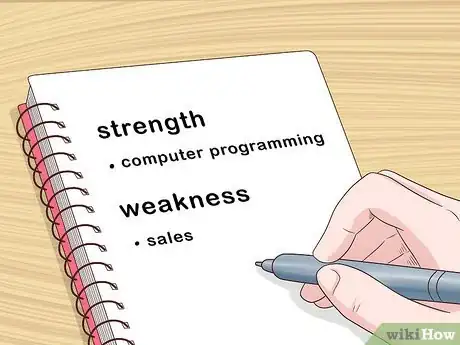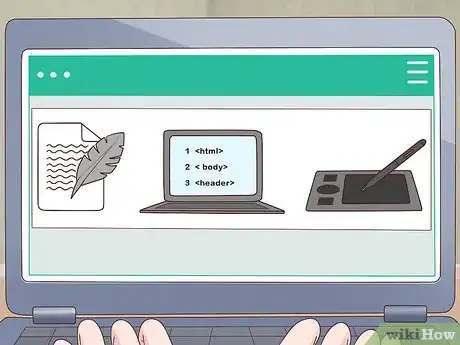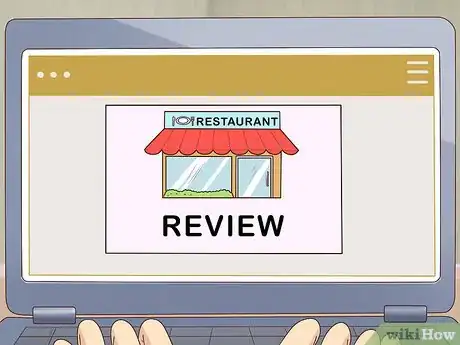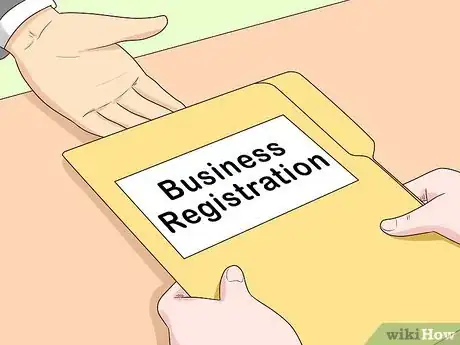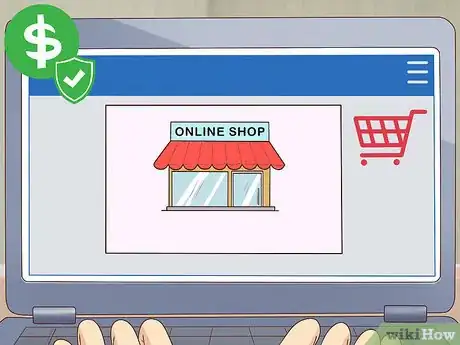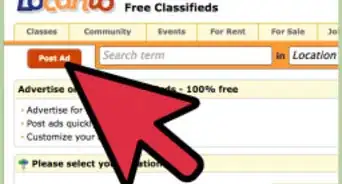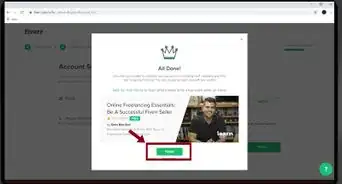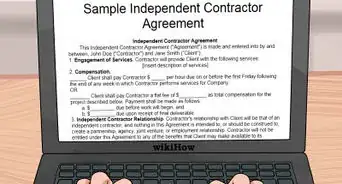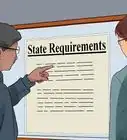This article was co-authored by Adrian Klaphaak, CPCC. Adrian Klaphaak is a career coach and founder of A Path That Fits, a mindfulness-based boutique career and life coaching company in the San Francisco Bay Area. He is also is an accredited Co-Active Professional Coach (CPCC). Klaphaak has used his training with the Coaches Training Institute, Hakomi Somatic Psychology and Internal Family Systems Therapy (IFS) to help thousands of people build successful careers and live more purposeful lives.
There are 15 references cited in this article, which can be found at the bottom of the page.
This article has been viewed 207,183 times.
In this day and age, finding a good job can seem like a chore. If you have a mind for trends or self-employment, you can find plenty of opportunities to create your own job. Many workers find new roles at their current jobs or turn to freelance work for flexibility. If you're ambitious, you can even start your own business. Seek new opportunities so you can find work that is both rewarding and fulfilling.
Steps
Creating a New Work Position
-
1List your strengths and weaknesses. Before you attempt to make a new position, take into account the ways you impact your company. You may find out that you aren’t showing your strongest points in your work. On the other hand, your weakest points can hold you back. Use your list to help you identify ways you can do better at work.[1]
- Creating a job at work is almost like going through a job interview. Not only can your strong points give you new ideas for jobs, but they make the company more likely to set up a new job for you.
- For example, you may realize that computer programming is your strong point, not sales, so you decide to transition to a job that involves computers.
EXPERT TIPAdrian Klaphaak is a career coach and founder of A Path That Fits, a mindfulness-based boutique career and life coaching company in the San Francisco Bay Area. He is also is an accredited Co-Active Professional Coach (CPCC). Klaphaak has used his training with the Coaches Training Institute, Hakomi Somatic Psychology and Internal Family Systems Therapy (IFS) to help thousands of people build successful careers and live more purposeful lives.Career Coach
 Adrian Klaphaak, CPCC
Adrian Klaphaak, CPCC
Career CoachFocus on discovering your strengths. Adrian Klaphaak, founder of career coaching company A Path That Fits, says: "You'll get a lot more value out of building on your strengths rather than trying to improve your weaknesses. To find your strengths, you can try taking an online strength assessment or asking people you trust to give you their feedback. You can also reflect on your life and your work, and identify a few experiences where you felt like you were in your element. Ask yourself what strengths you used in those moments. The ones that come up over and over are likely your core strengths."
-
2Come up with new ways to provide value to the company. If you want a job that doesn’t exist yet, you have to go out and get it. That may seem a little strange, but it’s up to you to convince the company that you’re the right person for the job. To do this, seize opportunities for new work and projects in addition to your existing responsibilities as an employee. Prove to the company that you’re a go-getter whose ideas should be heard.[2]
- Researching a company’s structure, goals, and employees is very helpful. Look for ways to modernize old jobs or areas the company falls short in.
- Pick the right projects for you. You don’t need to take on everyone’s extra work. Instead, understand your limits and try to stick to responsibilities that relate to the job you want.
- If you want to be a social media manager, for instance, you might volunteer for work that involves writing and advertising.
Advertisement -
3Sell the project to the boss. Draft a basic outline explaining what your project is, your duties, and what good it will do for the company. Try to summarize it in a single sentence you can offer to the company’s leaders. Tell them the summarized version face-to-face. If they are interested, you can then explain the project’s details.[3]
- If you’re uncertain about your project, ask a friend, mentor, or coworker for advice. Recite the summary in the mirror until you feel confident.
- You can say something like, “The company’s computer systems are out of date, and you can benefit by having me update, manage, and maintain them.”
- If you’re not already an employee of the company, your project pitch also doubles as an interview. Make sure you talk to someone with hiring power and document your proposal in writing.
-
4Take initiative when working on projects. Getting a new project off the ground can be a challenge, even if you get approval for it. Creating the job requires hard work persistence. Instead of waiting to be asked to do specific tasks, volunteer to do them in your spare time. Continue working and proving that the role you want to create is valuable.[4]
- Avoid resting on your laurels. It’s up to you to figure out what needs to be done to create the job and make it a reality.
- Use your judgment when waiting for permission. Something like charging a business expense requires permission, but doing extra work in your free time often does not.
-
5Prove your talents by showcasing what you contribute. To make a job permanent, you need to put your abilities on display. Find ways to keep bosses, hiring managers, and other influential figures on the same page with you. Normally a project worth doing proves itself through results, but sometimes you may need a push to get an opportunity.[5]
- For instance, if you want to design a website, show examples of graphical editing and coding. If you invent a new sales position, make a graph displaying how you increased sales.
- You should let your contributions show through no matter what kind of work you are doing. Even if you’re doing a routine task, do it well to improve the chances of a company letting you do something new.
-
6Stay on top of your existing duties. Usually, a new job isn’t created right away. You may find yourself working to create the job while also fulfilling other responsibilities. Taking care of those responsibilities first is important. You may feel a little busy, but it will be worth it when you succeed.[6]
- If you don’t handle the duties you were given when you were hired, you may have a hard time convincing companies to create a new job.
- If you are already employed by the company, discuss time management with your boss. Many bosses will help you and also recommend you to new roles befitting your skills.
- For instance, if you were hired as an accountant, you have to be an accountant until you are officially moved into another role.
Working as a Freelancer
-
1List what you would do in your ideal job. Freelancing is an opportunity to work on your own schedule. What you get in flexibility you lose in certainty. You may not get the security of steady work and an hourly wage, so you should focus your efforts on a strong skill you have that you enjoy doing.[7]
- Write down your work experiences, skills, strengths, and weaknesses to help you figure out what you want in a freelancing gig.
- As a freelancer, you are responsible for finding and completing all work. You could also work for someone else as an agent or independent contractor.
EXPERT TIP"An 'ideal job' is one that allows you to do what you love and that you're good at in a way that feels natural to you."
Adrian Klaphaak is a career coach and founder of A Path That Fits, a mindfulness-based boutique career and life coaching company in the San Francisco Bay Area. He is also is an accredited Co-Active Professional Coach (CPCC). Klaphaak has used his training with the Coaches Training Institute, Hakomi Somatic Psychology and Internal Family Systems Therapy (IFS) to help thousands of people build successful careers and live more purposeful lives.
Adrian Klaphaak, CPCC
Career Coach Adrian Klaphaak, CPCC
Adrian Klaphaak, CPCC
Career Coach -
2Choose an area or field to work in. Many different fields are open to independent contractors. Tasks like writing, computer coding, and drawing are often done for commissions, but they aren’t the only opportunities. Explore your options to find something you can do without becoming a paid employee for a company. Try asking around your area to find services that are needed but not currently available.[8]
- For example, you may be able to consult businesses on how to advertise or serve as a promotional agent for artists.
-
3Get any training you need to succeed. You may have identified an interesting job but don’t feel like you have the proper qualifications to succeed. A lot of education comes from hands-on experience, but you should also look for outside help. This can mean doing research at your local library, attending classes at a school in your area, or finding a mentor who has experience in the field you want to be a part of.[9]
- For instance, if you want to be a freelance writer but have no experience in publications, you can benefit from taking a few writing courses and getting a few articles into local publications.
-
4Create a resume to advertise your qualifications. Qualifications speak to your potential to produce great work. Most people will check to see what makes you a good hire. You should list your successful work experiences and have them available, whether you meet with clients directly or seek them online.[10]
- For example, your resume should list major work experiences and awards related to your work, such as that article you got into Quilters Monthly.
- An alternative to a resume is having a portfolio of your work. If you make websites, for instance, you should save your biggest and best work to wow potential clients.
-
5Network to keep friendly relations and meet potential clients. Networking is key, especially when you are first starting out. You may get few opportunities at first until you build your reputation. Reach out to new clients, fulfill their demands, and convince them to recommend you to new audiences. Most of this is done by locating clients and doing exceptional work for them.[11]
- Maintain professional relationships by meeting all expectations and deadlines. If you agree to do animation in a style you don’t like, you have to do it because the client wants it.
- Be friendly but not aggressive when chasing opportunities. Listen to your clients and don’t take it personally if they turn you down.
- Try advertising yourself on freelancer sites such as Upwork.
-
6Stay flexible to find new work when you need it. If you can’t seem to make enough money, take a step back and analyze your strategy. The service you provide may be too specific for most businesses or not in demand at the moment. Look for alternate opportunities, even if they aren’t 100% related to your ideal job.[12]
- A narrow idea such as a reptile care salon, for example, may not do as well as a salon that services dogs, cats, and birds as well.
- Think of natural extensions of your work. Many professional writers knew they needed to transition to computer skills as computers became more prevalent.
- Avoiding overextension is important as well. A large coding project on a deadline, for instance, may be better for a team than a single freelancer.
-
7Settle on a specialty after you have built an audience. With enough work, you may find a certain skill or service that sells well. This will become your speciality. Your specialty is your focus and your main source of income. Your skills will also grow from having to perform your specialty over and over again.[13]
- For instance, a certain art style or item you make may be more popular than others. You may find you do better writing restaurant reviews or consulting sports-related businesses.
-
8Look out for job and growth opportunities. Even if you become a successful freelancer, you may spot better opportunities. Businesses may hire you in an interesting role that gives you more money and perks. On the other hand, you may be able to turn your freelance work into consistent work that is rewarding in its own way.[14]
- For instance, if you do freelance transcription work, you may be able to hire others and form your own transcription service.
- Even if you take a regular hourly job, you can do freelance work on the side. Manage your time and avoid taking on more work than you can handle.
Starting Your Own Business
-
1Choose a job that fits your passions. Ideal jobs involve something you enjoy doing. Since you enjoy the subject or activity, chances are you already have some knowledge about it. It doesn’t matter how obscure your choice is. You can always change your plans later if you don’t think they will work out.[15]
- For instance, many computer developers got their start from an interest in technology.
- Combining interests may help you come up with a unique idea. You can open an online store crafting and selling merchandise from your favorite movie or video game series, for example.
- Another way to choose an idea is to see what services are lacking in your area. If your area has a demand for dog walkers but no one has filled that role yet, you can step in.
-
2Practice your craft until you get good at it. Be the best you can be so you can continually attract new customers. Study the good or service you wish to provide. Read about it and try doing what you want to do before you monetize it. You should seek to improve your product before and after you start your business. Expect to make mistakes along the way, but use these as learning experiences rather than failures.[16]
- For example, if you want draw for commissions, you may not be the world’s best drawer at first. With practice, you can become more talented and attract more business.
- Try taking classes online or at a local school. Whether you want to weld rings or start a translation service, professional instruction can help you improve your skills,
-
3Create a business plan. Writing down your ideas can help you find a cohesive vision for your business. A business plan describes what your company will sell and how it will sell it. Write out other aspects, such as who will work for you, where you will put your funding, and how you will overcome challenges you face.[17]
- Your plan doesn’t have to be big and comprehensive at first. Do your best with it for now, then edit it as your business grows.
- Having a plan can be useful if your business grows. Many investors will need to see a plan before they give you money.
-
4Select a name for your business. Most businesses have a unique, catchy name that is easy for customers to remember. Your name is your brand. You do not have to come up with a clever name, but it is important if you plan on having a physical storefront or advertising.[18]
- Your business name should sound professional but related to your field. For instance, Shampoodle is a fitting name for a dog grooming business.
- When you come up with a name, make sure other businesses aren’t using it. Do a quick search online and check social media websites to see if the name is available.
- If you plan on working alone, your name can often double as a business name. Many consultants, artists, and other professionals depend on name recognition.
-
5Register your business if it is required in your area. Registration requirements vary from area to area, so research your local laws. In many places, you do not need to register a 1-person business as long as you use your real name. If your business uses a different name, you may need to register it with your state government to get a business ID.[19]
-
6Secure funding for your business. Starting a business requires an initial investment to pay for supplies, electricity, and whatever else you need to operate. While you can get a loan, you may not need to put yourself in debt if you plan on working for yourself. Find unique ways to deliver your goods or services without taking on extra expenses.[20]
- For example, you can start an online store from the comfort of your own home. You could visit customers to give them private music or fitness lessons.
- Getting a loan is useful if your business’ scope is large and costly, like if you wanted to set up a store, stock it, and hire employees.
-
7Network to build an audience for what you sell. The first part of building a network is to please your initial customers. Ask them to spread the word by recommending you to their friends and by posting positive reviews online. Also, reach out to new potential customers and opportunities that allow you to build your business.[21]
- Networking can be a challenge. You may have to deal with some criticism and negativity before your business feels stable.
- Work with other businesses in your area. Make friends with their owners. A lot of businesses, for instance, recommend customers and advertise with each other.
-
8Build your income stream by improving your visibility. There are many ways you can grow your business, from physical merchandise to online ads. Always be aware of new opportunities, such as traveling to meet new customers. Build your online presence as well to ensure customers know your name.[22]
- Starting a website is a useful first step you can do for free. Also start social media accounts under your business name.
- You can order promotional cups and pens, for instance, or start an online store to sell products outside your area.
Community Q&A
-
QuestionHow can I create a job for myself if I am a civil engineer?
 Community AnswerStart your own civil engineering firm.
Community AnswerStart your own civil engineering firm. -
QuestionDo I have to write the details of the job down?
 Community AnswerThat's a broad question. It would help to know what you're seeking before asking that question but as a general answer, here it goes. You should always write down your plan or proposal. even if it's only small personal goals, whether in a notebook or home office, they should be accessible. Keep sticky notes on your desk if it helps. It always keep your eyes on the prize. Hard work, experience and dedication does pay off.
Community AnswerThat's a broad question. It would help to know what you're seeking before asking that question but as a general answer, here it goes. You should always write down your plan or proposal. even if it's only small personal goals, whether in a notebook or home office, they should be accessible. Keep sticky notes on your desk if it helps. It always keep your eyes on the prize. Hard work, experience and dedication does pay off. -
QuestionHow do I become a private tutor?
 Community AnswerWrite up a business plan outlining what subjects you can tutor, what methods you will use, your target demographic (what age groups you will tutor), how you will receive payments, locations you can tutor (online is an option!). Then start advertising. Put a system in place for tracking your inquiries, billing, your students and their progress, etc. Depending on your goals, you may want to register as an NPO service or an individual business, or even start a partnership with a friend who shares your tutoring passion.
Community AnswerWrite up a business plan outlining what subjects you can tutor, what methods you will use, your target demographic (what age groups you will tutor), how you will receive payments, locations you can tutor (online is an option!). Then start advertising. Put a system in place for tracking your inquiries, billing, your students and their progress, etc. Depending on your goals, you may want to register as an NPO service or an individual business, or even start a partnership with a friend who shares your tutoring passion.
Warnings
- Be sure to register your business and get any licenses required by your government or else you will get into legal trouble.⧼thumbs_response⧽
References
- ↑ https://www.fastcompany.com/3067743/how-to-create-your-own-opportunities-at-work
- ↑ https://careers.workopolis.com/advice/five-tips-for-creating-your-own-job/
- ↑ https://www.fastcompany.com/3067743/how-to-create-your-own-opportunities-at-work
- ↑ https://www.theguardian.com/careers/find-dream-job-create-own
- ↑ https://www.nytimes.com/2012/03/04/jobs/finding-a-new-job-by-creating-one-in-your-own-company.html
- ↑ https://www.fastcompany.com/3067743/how-to-create-your-own-opportunities-at-work
- ↑ https://www.glassdoor.com/blog/create-job-doesnt-exist/
- ↑ https://careers.workopolis.com/advice/five-tips-for-creating-your-own-job/
- ↑ https://www.smh.com.au/money/planning-and-budgeting/create-your-own-new-job-20150115-12qw58.html
- ↑ https://designshack.net/articles/business-articles/how-do-you-list-freelance-work-on-your-resume-we-have-the-answer/
- ↑ https://medium.com/the-story-of-grip/the-definite-infographic-for-how-to-network-as-a-freelancer-b166ca7edcd2
- ↑ https://www.smh.com.au/money/planning-and-budgeting/create-your-own-new-job-20150115-12qw58.html
- ↑ https://www.smh.com.au/money/planning-and-budgeting/create-your-own-new-job-20150115-12qw58.html
- ↑ https://www.smh.com.au/money/planning-and-budgeting/create-your-own-new-job-20150115-12qw58.html
- ↑ https://www.forbes.com/sites/berlinschoolofcreativeleadership/2014/06/17/looking-for-the-perfect-job-stop-searching-create-it-yourself/#18f5ebc8170a
- ↑ https://zenhabits.net/job/
- ↑ https://www.entrepreneur.com/article/198618
- ↑ https://www.entrepreneur.com/article/21774
- ↑ https://smallbusinessbc.ca/article/how-start-your-business-your-legal-requirements/
- ↑ https://zenhabits.net/job/
- ↑ https://www.entrepreneur.com/article/308204
- ↑ https://www.forbes.com/sites/deborahljacobs/2011/12/14/how-to-make-money-without-a-job/#2bb55e8d23b1
About This Article
If you want to make a job for yourself, start by deciding what you're good at doing, and come up with a portfolio of examples of your work. Search online to see if you need any professional training for the job, and find companies that are looking for freelancers. Alternatively, if you want to make a new job at the company where you already work, propose your new position to your boss with data about why that position is necessary and how you would succeed in that role. At the same time, try to take initiative by working on new projects that showcase your abilities in the position. For advice on how to start your own business as a freelancer and find jobs, read on!
